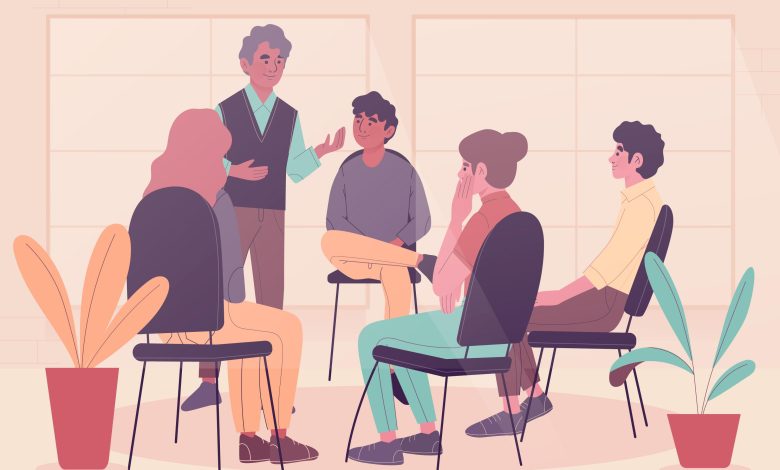What is Mental Health Group Therapy ?

You engage in group therapy when you visit with a licensed mental health professional and at least two other individuals. Despite the fact that groups can be of any size, it’s usual to limit them to a maximum of 10 people so that everyone gets a chance to contribute. There are two types of groups: closed groups and open groups.
For closed groups, the same people regularly attend every meeting or every week. However, anyone can join open groups, which are available to the general public. There are a number of important benefits to group therapy even though it may not be appropriate for everyone.
What are the Benefits of Group Therapy?
Participating in group therapy has various advantages, and different people will get different insights from it. Here are just a few advantages that you could get from attending a group session.
Provides Extra Support and Guidance
Sessions in individual therapy are great for examining complicated feelings and situations. However, group therapy is wonderful when you need extra support because both group members and a mental health professional will provide it. In a group therapy session for stress or anxiety, everyone is there for the same reason as you, which may provide you support and let you know that you are not the only one facing difficulties.
Enhances Communication and Acquired Abilities
Have you been making an effort to hone your communication abilities? Or maybe you’re prepared to apply the coping mechanisms you developed in individual treatment. In a group treatment setting, you can practice until you’re an expert in a secure and encouraging environment.
Builds Relationships and Social Skills
You communicate with people and experience less loneliness thanks to group therapy. If you wish to connect with one another and create lasting connections, you may realise that you have common experiences.
Sharing can be Healing
Sometimes just expressing what’s going through your head is all therapy need. Additionally, if someone else is having a difficulty that you have already encountered, it gives you the option to help by giving your point of view.
Getting the Most out of Group Therapy
Participants may be required to abide by the rules that each organisation has established. This can help establish guidelines and clarify roles for everyone in the organisation. There is no doubt that you will benefit more from it if you give more.
There will undoubtedly be days when you don’t feel like taking part, and that’s okay. When you do decide to share your experiences, just remember that you never know how meaningful it can be to someone else.
When to Choose Group Therapy Over Individual Therapy
Though it’s not appropriate in every circumstance, group therapy may be a wonderful experience. Sometimes, individual counselling may be more beneficial for your circumstances. Many various mental health issues, such as psychological illnesses, depression resistant treatment, anxiety disorders, and more, can be helped by group and individual treatment.
Which is “better” may only be a matter of taste on some level. Individual treatment sessions may be more comfortable and productive for certain people than group therapy sessions. Of course, the reverse is also possible. Some people could flourish while discussing group therapy subjects with other people in a group environment.
Using group or individual treatment might rely on a number of different things. A key element may be affordability. Compared to individual therapy, group therapy can be significantly less expensive. The degree to which a person is at ease addressing concerns with large gatherings of people is another factor that may be at play.
In the end, it’s frequently difficult to say with certainty which style of therapy is superior to the others. Different strategies are used in group therapy and individual treatment to assist clients in achieving the same objective.
How to Maximize the Benefits of Group Therapy
There are a few things you may do to maximise the benefits of your group therapy.
Take an Honest Pledge:
Each member should sign a contract before beginning group therapy. In this manner, everyone is aware of what is expected of them. This makes sure that everyone feels at ease and has confidence that anonymity and a certain degree of respect will be upheld. There may be less anxiety or reluctance to participate openly and honestly when everyone is aware of the expectations and is on the same page.
Be a Willing Participant
Therapy might be difficult, but you’ll benefit more from it if you put more effort into it. Try to give the session your best effort, even on the days when you show up but just aren’t feeling it.
Share with Care
You’ll benefit by being open, but there may be much more to it. In fact, you could hold the secret to someone else’s breakthrough. It goes without saying that you should never feel forced to give to others or that you owe them anything.
But keep in mind that what you’re sharing might be really important to someone else. Your desire to contribute could have the same effect as one of those “A-HA” moments when someone says something that strikes a chord with you.
Group therapy has a lot to offer. It could be just what you’ve been seeking for in your quest for healing and self-awareness. You should learn more about the benefits of group therapy if you’re interested in doing so.
So many individuals discover that it may be a crucial component of their progress, whether it be personally, professionally, or in any other area of their lives that they wish to enhance.
Different types of Group Therapy
Group therapy comes in a lot of various shapes and sizes. The objectives of an organisation determine how it functions. Process-oriented groups and psychoeducational groups are the two basic categories.
Process-Oriented Groups
One of the main areas of concentration is the group members’ interpersonal interactions. Opening up in front of others can be difficult, but when a person feels a sense of acceptance and belonging from their peers, it can also result in significant development and progress. Working with these transitions and obstacles is the foundation of process groups.
A process group may centre only on the interactions that occur within the group itself, or it may be focused on a shared concern in members’ lives outside the group.
This kind of group is normally flexible, and the weekly agenda is usually decided by the group members themselves. When necessary, the therapists guide the conversation; nevertheless, they are not the centre of attention. Process groups typically last for six months.
Psychoeducational Groups
are primarily concerned with imparting knowledge on a certain subject or teaching skills (e.g., anger management, cognitive-behavioural therapy). In this form of group, relationships between participants are less significant, yet interacting with others going through same struggles can still be helpful.
In groups that are psychoeducational, the therapist takes on a more active role and serves as an educator. These groupings are more likely to have a short lifespan.
Who can Group Therapy benefit?
Research on group therapy’s efficacy is extensive. It may provide benefits for certain persons that individual psychotherapy might not.
For instance, talking with friends who are “in the same boat” might provide those who feel isolated in their challenges confidence and encouragement. Additionally, group spravato treatment is typically less expensive than individual therapy.
Here are some key benefits of group therapy:
- Members in the group can feel welcomed and supported, and the group dynamic helps lessen isolation and stigma.
- While the diversity of experience might inspire ideas for fresh approaches to overcoming obstacles, the commonalities among members can foster a feeling of community.
- The organisation offers a secure setting where members may try out novel social behaviours and take social risks.
- Participants can improve their understanding of how they interact to others and alter their interpersonal dynamics through group therapy.
- The therapists may see how each participant behaves in a social setting by watching the group in action, which
Risk of Side Effects
Psychotherapy normally carries very little danger. Therapy may occasionally be emotionally distressing since it requires talking about challenging aspects of your life. A skilled therapist will be aware of this and will help you navigate these feelings.
Rarely, the ideas and emotions that therapy brings up might be really unpleasant. It’s critical to communicate your experiences to the therapist in these circumstances so they can support you while you safely process your emotions.




